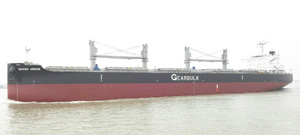Semi-open Hatch Type Bulk Carrier Ginkgo Arrow Delivered
Jan. 30, 2015

Tokyo, January 30, 2015 — Kawasaki Heavy Industries, Ltd. delivered today the semi-open hatch type bulk carrier Ginkgo Arrow to Cardinal Maritime S.A. at Nantong COSCO KHI Ship Engineering Co., Ltd. (NACKS) located in Nantong, China. The vessel (Kawasaki hull no. 8017, NACKS hull no. NE163) is the forth of the new semi-open hatch type bulk carrier developed jointly by Kawasaki and NACKS.
| Delivery, principal particulars, and features of the vessel are as described below. | |
|---|---|
| Delivery: | January 30, 2015 |
| Principal Particulars | |
|---|---|
| Length overall: | 199.90 m |
| Length BPP: | 197.00 m |
| Molded breadth: | 32.24 m |
| Molded depth: | 18.60 m |
| Molded draft: | 13.00 m |
| Gross tonnage: | 35,503 t |
| Deadweight: | 61,026 t |
| Hold capacity: | 71,085 m3 |
| Main engine: | One set of HHM-MAN B&W 6S50ME-B9.2-TII diesel engine |
| Maximum continuous output: | 8,130 kW at 108 rpm |
| Speed: | Approx. 14.45 kn |
| Complement: | 25 people |
| Class: | Nippon Kaiji Kyokai (ClassNK) |
| Registry: | Panama |
Features
- The vessel has a flush deck with a forecastle and five holds that are designed for optimum transport of grain, coal, ore, wood pulp, lumber, steel products etc. It can also carry lumber on its hatch covers.
- The vessel type is positioned between the standard bulk carrier and the open hatch type bulk carrier. All of its holds have double-hull structure with large hatch opening. The three holds in the middle part of the vessel are box-shaped for efficient handling of cargo like wood pulp and other products.
- Four 36-ton deck cranes are installed along the centerline in between hatch covers to enable cargo loading and unloading in ports that lack cargo handling facilities.
- The vessel employs the latest in technology to minimize fuel consumption, including an energy-saving, electronically-controlled main diesel engine, highly efficient propellers, the Kawasaki rudder bulb system with fins (RBS-F) and semi-duct system with contra fins (SDS-F), as well as a bow designed to reduce wave resistance, which all contribute to the vessel’s enhanced propulsion performance.
- The main engine and generator engine comply with Tier II NOx emission standards set by the International Convention for the Prevention of Pollution from Ships.
Contact
If you need more information about our business,
please feel free to contact us.





